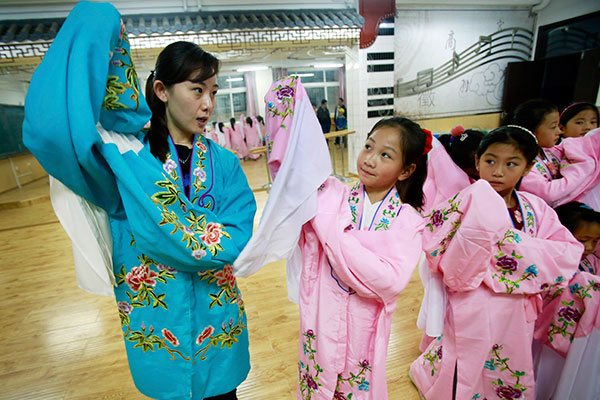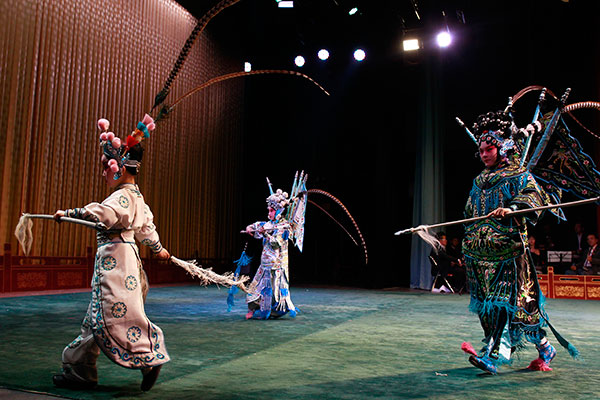
Peking Opera actress Sun Yunyun shows a movement to students at the Linheli Primary School in Beijing’s Tongzhou district.[Photos by Zhu Xingxin / China Daily]
Hundreds of primary students embrace the song, dance of a fading national treasure.
Peking Opera may have lost its place in the pantheon of popular entertainment, but devoted fans of the classical Chinese theater are looking to cultivate new appreciation among schoolchildren for a fading national treasure.
Since 2008, Beijing has promoted a program to provide opera training at dozens of primary schools. Schools apply for funds from the city’s education department to hire professional actors and actresses to work with students as young as 6 or 7.

Performers from Chunhui Zixi Children’s Peking Opera Theater stage a show in Beijing.
Every Friday morning, graduate students from the National Academy of Chinese Theater Arts arrive at Shijia Fenxiao Primary School in Beijing’s Dongcheng district to teach opera techniques to about 200 students.
Six-year-old Cao Wuyou works hard to follow the teacher’s instructions in the classic moves of vocal performance, dance and acrobatics. Some of her moves are awkward, but soon another tip from her teacher inspires her to get it right. She move her eyes in the direction of her hands, a surefire way to attract the attention of an audience.
“My grandparents were huge fans of the opera and I overheard the opera on radio. They sang and practiced moves at home that aroused my interest,” Cao said.
In 40 minutes, the class was finished and the children were told to practice at least 10 times at home. Cao said her parents were very supportive to her opera training, and she would have enough time for the assignment.
Peking Opera features four main types of roles: sheng (male roles), dan (female roles), jing (painted face roles) and chou (clowns). Each type is further subdivided. An actor or actress typically trains for a single type of role, so students are divided too.
The professionals employ speech, song, dance and combat in their performances. Their skills, developed over years of practice and training, are evaluated based on the beauty of their movements.
Currently, major performance Peking Opera troupes are based in major cities such as Beijing, Tianjin and Shanghai.
Peking Opera arose during the rule of Emperor Qianlong in the Qing Dynasty (1644-1911). It flourished for decades in China and as its fame spread, it drew audiences in other countries, including the United States and Japan.
Yet over the years, its popularity diminished. While a significant number of people listened to radio productions of Peking Opera before the 1980s, generations born after that pursued pop culture over the traditional arts.
The opera’s audience has dwindled to just the middle aged and seniors, said Liu Guofu, a Peking Opera theory teacher at the Shijia school.
In a countermeasure, the Ministry of Education said operas such as Peking Opera would be added to the primary school curricula as an extracurricular choice, allowing students the option of enriching their spare time while gaining an appreciation for the vanishing art.
The Shijia school also provides other courses that describe the theory and history of Peking Opera. And Beijing’s education department approved textbooks for the Peking Opera, including Learn Peking Opera in Amusement.
Liu, the Shijia teacher, said his job is to give students an overall picture of the art form. The younger generation should know the origin, development and present status of the Peking Opera in addition to costumes and facial paintings, Liu said.
Each semester, Liu uses photos and videos to show students the difference between the opera, television and movies. Vivid images make boring theories more interesting and pique students’ imaginations with a desire to learn, Liu said.
From Liu’s perspective, Peking Opera has the ability to subconsciously inspire students to love their families and the country. The classical play of the story of Yue Feng, a general in the Southern Song Dynasty (1127-1279), cultivates patriotism, he said.
The training program seeks to build future audiences, not recruit professional performers, but there is always a student or two who are especially captivated.
Hu Jiahua, 8, a student in Tongzhou district who has studied opera for two years, said he likes pop music, but loves opera, so his parents bought him videos to help him practice at home.
“The opera has special charm for its distinct moves and singing. Though I am amateur in the art form now, I have a dream to become a professional performer when I grow up,” Hu said.
